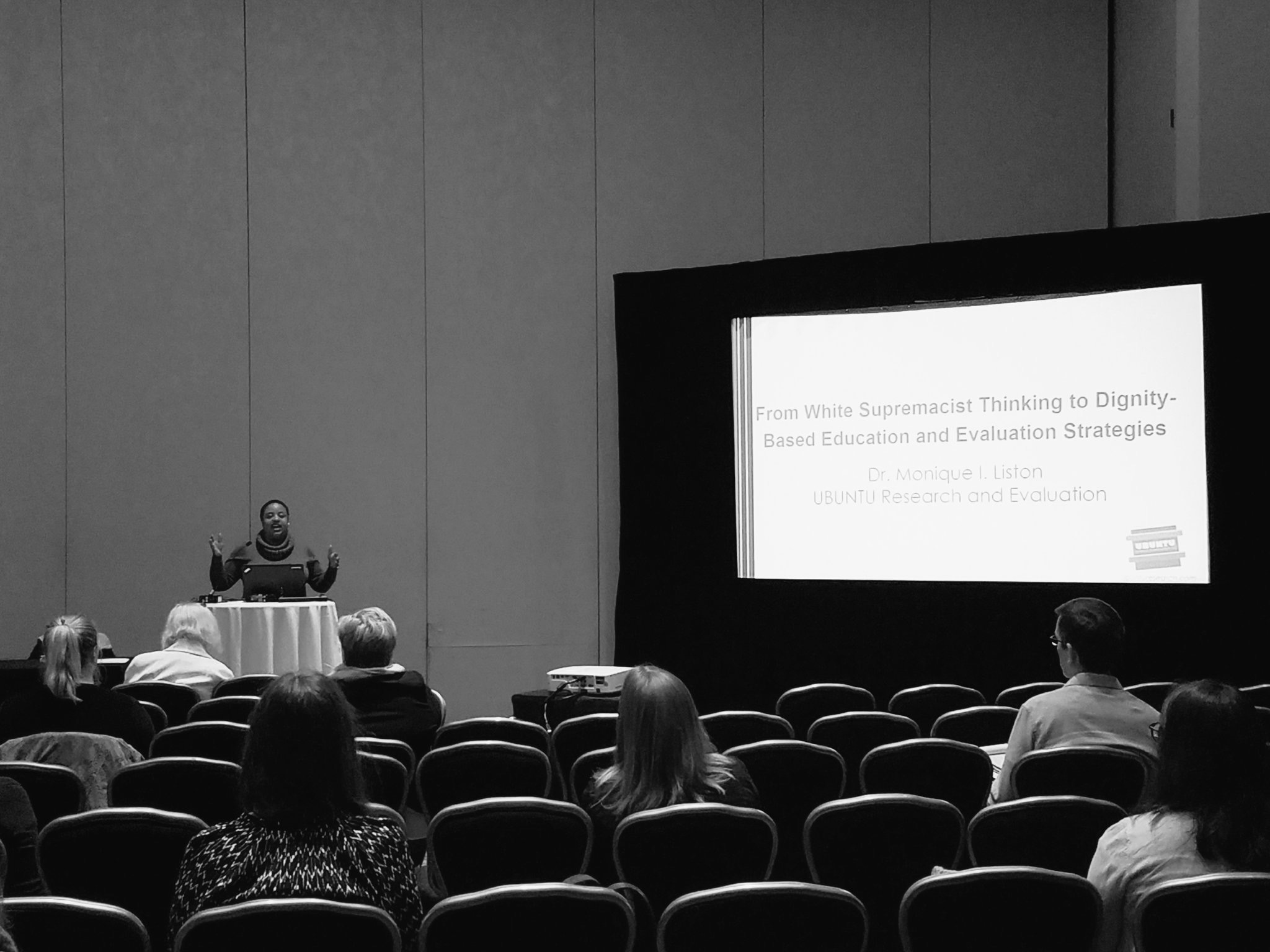#INEEDANSWERS - Four Critical Questions about Whiteness and White Supremacist Thinking This AM
Monique is on location at the American Evaluation Association Annual Meeting in Washington DC. You can watch video of her presentation on Facebook (or below). Send her an email or Facebook message to connect while she's in town!
Four Critical Questions about Whiteness and White Supremacist Thinking This AM
1. How can we get free from Middle Class Standard Time dictating the ways in which we teach and learn about race, equity and liberation?
Last week, I came across this amazing piece (although almost five years old) about middle class standard time. Andrew Willis Garcés is an educator and consultant that wrote a short blog post about time. In summary, he argues that time is a social construct. Therefore its meaning and usage is determined by the value placed on it by the communities who have power. "Middle class values" in American society end up dictating our space. My initial thought after reading this piece was this is an example of what bell hooks meant by "white supremacist thinking" dictating how we communicate and engage with one another. The white supremacist capitalist heteropatriarchy defines the utility and function of time in the public space. As an educator this is most evident in the classroom -- where teachers are asked to use small amounts of time to basically teach students concepts that they need years to understand at the levels that would make the information most useful for them. As a consultant this is also evident when I propose timelines and budgets (even to other Black people --- again read bell hooks) that focus on depth of my work as opposed to breadth. My goal is to engage and produce meaningful work --- but no one wants to pay for that kind of time.
2. Who is responsible for white people reading about race?
Yesterday, after presenting this...
A white presenting male came up to me and colleagues to share that he "doesn't want to be associated with whiteness".
Me:
My colleagues:
Turns out homeboy had been reading Ta-Nahesi Coates book Between the World and Me. He read where Coates said "white people need whiteness" -- a true statement about power in global society. He decided that he didn't need that and was going to start claiming it.
That's problematic, however. Instead of engaging the work of undoing harm, working on equitable practices, or imagining a liberated society this cat went ahead and did the whitest thing ever -- removed himself from the problem and claimed it as success.
The moral of the story is -- Who is going to be responsible for People of White reading lists and study groups? If we leave them to their own they are going to come back talking so much illogical nonsense that we might need to get on some Spacetraders stuff asap.
3. Why do white people colonize everything -- especially discomfort?
When I am contracted with an entity to talk about race, some folks love me, some folks hate me. There is rarely an in-between. But what is always a given, is someone asks me if there is a "lighter" or "less abrasive" or "more comfortable" way to talk about race with white people than me --- angry Black woman --- giving them critical reflection questions, citations out the ass, and true life examples about the impact of whiteness and racialization in society.
My approach about discomfort is always -- GOOD. That means you are at the point where you either take the leap and learn about yourself, others and the human condition or you can know - without question - that you prefer racism as an entree with a side of bigot and diet queerphobic to drink.
However, more often than not -- my response about discomfort is always HOW DO YOU THINK POC/WOC/QUEER/LGBT/DISABLED folks ALWAYS feel? If that don't get them thinking, I need to send them to whoever is the answer for Question 2.
4. Should Light-Skinned People of Color Voluntarily Exclude Ourselves from People of Color Spaces?
A colleague and I were talking with a brilliant Black seventh grade student. She remarked about how pretty my colleague is (she is!) but asserted that she was pretty because she was light-skinned.
This brilliant brown-skinned child -- attending a school that uplifts Black culture ALL DAY and EVERY DAY, taught by Black teachers, lead by a Black principal STILL is infatuated with light skin in the year 2017.
I read this article, Should Light-Skinned People of Color Voluntarily Exclude Ourselves from People of Color Spaces? earlier this summer and have not fully recovered. In another blog post, another day, I will talk about how I came to understand colorism. But my question --- considering the reality of that student and the points raised in this article is --- should I remove myself? If so, what does that mean? What do I do?
(and understanding that if I am not willing to engage this question seriously, I can never expect white folks to do it or in POC/Black spaces for them to do the same around gender and queerness)
Happy Friday,
Monique




